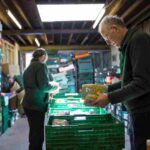A new study says that the majority of plants growing in the wild in the UK are not native. Further, more than half of native plants are estimated to be in decline, according to results of a study released on 8 March.
The intensification of arable cultivation has been the main driver of change. This is according to the Plant Atlas 2020 study undertaken by the Botanical Society of Britain and Ireland (BSBI).
A study spanning two decades
The 20-year project is the most comprehensive study ever undertaken on UK wild flora. Volunteers submitted over 26 million records, which included over 3,445 different species. Those included 1,692 that are native to the UK.
The BSBI study said that 1,753 non-natives had been deliberately or accidentally introduced into the wild by humans.
It added:
This startling finding means that there are now more introduced plants growing in the wild in Britain than natives, with many originating from gardens and then spreading to establish self-sustaining populations
The study’s authors compared their results with similar findings from the 1950s. They showed that 53% of native plant species are in decline. In contrast, 58% of recently introduced species have increased.
Intensive farming is endangering native plants
The report noted that the intensification of arable agriculture had led to the “substantial declines of many plants”.
It said:
grassland and heathland plants that grow on infertile soils have suffered marked declines due to the conversion of their habitats to arable or more productive agricultural grasslands,”
The drainage of wetland habitats has also had an impact on native plants. Species growing around rivers and canals have also declined, mainly due to the effect of run-off from agricultural land.
Forests, however, are proving to be a haven of biodiversity. The report stated:
In comparison, the distributions of plants associated with woodlands have remained relatively unchanged
Climate change is another factor
The report suggests that the decline in native species is also down to climate change. It said that some southern species have expanded their ranges northwards while some northern species have retreated at their southern limits, which correlates with our warming climate.
The report’s authors warned:
The overall message is clear — our native flora is much diminished relative to the situation recorded by our predecessors in the 1950s
They continued:
We need a holistic plan of action to reverse this decline so that our flora can be restored and flourish for the benefit of this and future generations.
The BSBI report is the largest study of its kind. Its authors painstakingly studied millions of records compiled by volunteers over the course of two decades. Its findings are startlingly clear – although sadly not surprising. Industrial agriculture and climate change are threatening the UK’s biodiversity. Only the preservation of the UK’s remaining forests and wetlands – and stemming further climate crisis – will prevent that.
Featured image via Stephen James McWilliam/Wikimedia Commons, cropped to 770×403
Additional reporting via Agence France-Presse

















